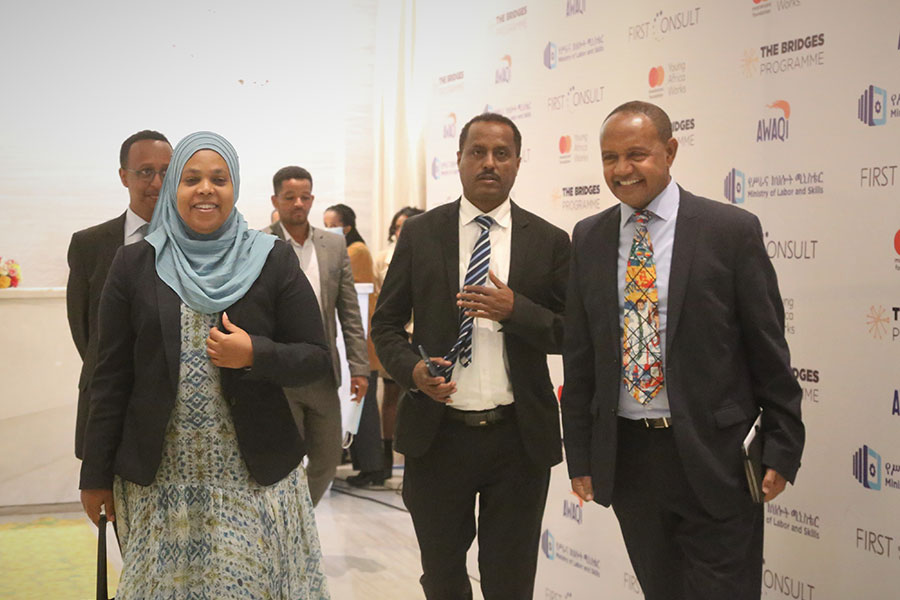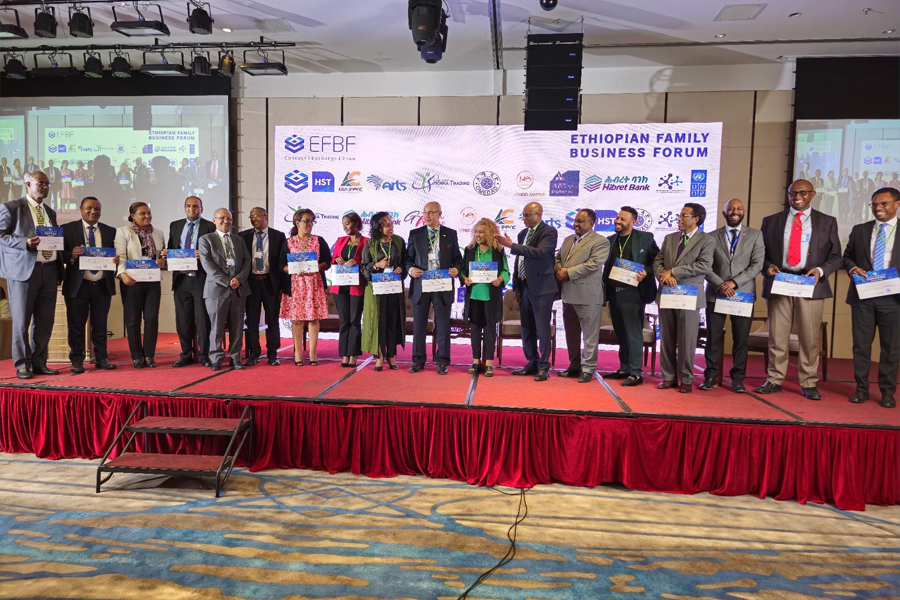
Radar | Sep 29,2024
Oct 3 , 2024
By Desalegn T. Zegeye (MD)
Adolescence is a defining phase in human development, marked by profound physical, emotional, and social changes that lay the groundwork for an individual's future. Yet for millions of young people in Ethiopia, this transformative stage is overshadowed by a mental health crisis that threatens not only their well-being but also the country's prospects for growth.
Take the story of Amina, a 16-year-old girl from a rural village near Addis Abeba.
Struggling with anxiety and depression, she struggled with emotional distress in a community where mental health issues are stigmatised and misunderstood. Her academic performance has declined in an environment where access to proper support or services is lacking. She has become increasingly isolated from her peers.
Amina's experience mirrors a broader and entrenched problem affecting the youth.
Globally, mental health issues during adolescence contribute to the overall disease burden. The World Health Organisation (WHO) estimates that up to half of mental health problems begin before age 14. Conditions such as anxiety, depression, and behavioural disorders account for a substantial portion of disability among young people worldwide.
In Ethiopia, the situation is particularly alarming. Estimates suggest that 11.4pc of adolescents aged 10 to 19 experience mental health disorders, a figure translating to over three million young people caught up with a health crisis that can have lifelong repercussions. Several factors exacerbate poor mental health outcomes among adolescents, especially in low-resource settings where poverty, inequality, and violence are prevalent.
Economic hardships and limited access to essential services like healthcare and education intensify environmental stressors. Adolescents in these communities often face emotional distress that, if left unaddressed, can lead to chronic mental health issues. Systemic barriers compound these problems. A widespread lack of mental health awareness and a scarcity of support services leave many adolescents without the help they need.
Mental health disorders are frequently stigmatised, discouraging young people and their families from seeking assistance. This stigma encourages a cycle of silence and isolation, where adolescents like Amina deal with their struggles alone. According to a study in the Ethiopian Journal of Health Sciences, over 60pc of adolescents with mental health issues receive no treatment or counselling.
Substance use among adolescents is a growing concern, adding another layer to the crisis. Alcohol consumption, chewing khat, an stimulant leaf, and smoking are increasingly common, with devastating effects on mental and physical well-being. A survey by the Ethiopian Public Health Institute found that 15pc of adolescents engage in regular chewing of this substance, while 10pc consume alcohol weekly. Many turn to substances as a coping mechanism for stress, anxiety, and depression linked to their environments. Substance use worsens existing mental health issues and introduces new problems, further entrenching young people in cycles of distress and risky behaviours.
Addressing substance use requires comprehensive prevention and intervention strategies tailored to adolescents' needs. Families, schools, and communities should cooperate to provide education, support, and access to services for those at risk or already engaging in substance use. Initiatives like community outreach programs and school-based counselling can play crucial roles.
The federal government has acknowledged the problem and taken steps to address adolescent mental health through national strategies. The five-year strategy for mental health response, beginning in 2020, outlines goals for improving services across the country, including integrating mental health into school curricula and training health workers, teachers, and communities. However, progress has been slow, and many of the strategy's plans remain unrealised. Budget constraints, limited infrastructure, and a shortage of trained professionals impede effective implementation.
As this strategy approaches its final year, it is evident that more focused efforts are needed to prioritise adolescent mental health in the next national agenda. A severe shortage of child and adolescent mental health specialists remains an issue, with reports indicating fewer than one specialist for a million people. The shortage pressed for capacity-building initiatives to expand the workforce and improve service availability.
Addressing the crisis requires a coordinated national strategy focusing on prevention, early intervention, and treatment. Capacity-building should be a priority, focusing on increasing the number of trained professionals equipped to address adolescents' unique challenges. This includes psychiatrists, psychologists, social workers, and community health workers trained in mental healthcare.
Schools should be integrated into the response work because of their crucial role. Embedding mental health education into the curriculum and providing trained counsellors can create a supportive environment. Teachers can be trained to recognise signs of distress and refer students to appropriate services. Cooperation between schools, professionals, and communities is essential to offering the necessary support.
Leveraging telehealth and digital platforms can extend services' reach to adolescents in remote or underserved areas. Mobile phone penetration has grown immensely, providing an opportunity to deliver counselling and support through apps and hotlines. These platforms can offer assistance in private to those who might otherwise have no access to care. Community awareness campaigns focusing on reducing stigma and encouraging families to seek help for their children are also important. Religious and community leaders can be engaged to promote understanding and acceptance of mental health issues, helping to break down cultural barriers that prevent seeking help.
PUBLISHED ON
Oct 03,2024 [ VOL
25 , NO
1275]


Radar | Sep 29,2024

Advertorials | Jun 05,2023

Radar | Jul 24,2023

Commentaries | Jul 07,2024

Sunday with Eden | Apr 15,2023

Radar | Jul 17,2022

Advertorials | Sep 24,2024

Fortune News | Nov 24, 2024

Fortune News | Apr 15,2023

Agenda | Sep 22,2024

My Opinion | 132272 Views | Aug 14,2021

My Opinion | 128692 Views | Aug 21,2021

My Opinion | 126600 Views | Sep 10,2021

My Opinion | 124206 Views | Aug 07,2021





Dec 22 , 2024 . By TIZITA SHEWAFERAW
Charged with transforming colossal state-owned enterprises into modern and competitiv...

Aug 18 , 2024 . By AKSAH ITALO
Although predictable Yonas Zerihun's job in the ride-hailing service is not immune to...

Jul 28 , 2024 . By TIZITA SHEWAFERAW
Unhabitual, perhaps too many, Samuel Gebreyohannes, 38, used to occasionally enjoy a couple of beers at breakfast. However, he recently swit...

Jul 13 , 2024 . By AKSAH ITALO
Investors who rely on tractors, trucks, and field vehicles for commuting, transporting commodities, and f...

Jul 12 , 2025
Political leaders and their policy advisors often promise great leaps forward, yet th...

Jul 5 , 2025
Six years ago, Ethiopia was the darling of international liberal commentators. A year...

Jun 28 , 2025
Meseret Damtie, the assertive auditor general, has never been shy about naming names...

Jun 21 , 2025
A well-worn adage says, “Budget is not destiny, but it is direction.” Examining t...

Jul 13 , 2025 . By YITBAREK GETACHEW
The Addis Abeba City Revenue Bureau has introduced a new directive set to reshape how...

Jul 13 , 2025 . By BEZAWIT HULUAGER
Addis Abeba has approved a record 350 billion Br budget for the 2025/26 fiscal year,...

Jul 13 , 2025 . By RUTH BERHANU
The Addis Abeba Revenue Bureau has scrapped a value-added tax (VAT) on unprocessed ve...

Jul 13 , 2025 . By NAHOM AYELE
Federal lawmakers have finally brought closure to a protracted and contentious tax de...